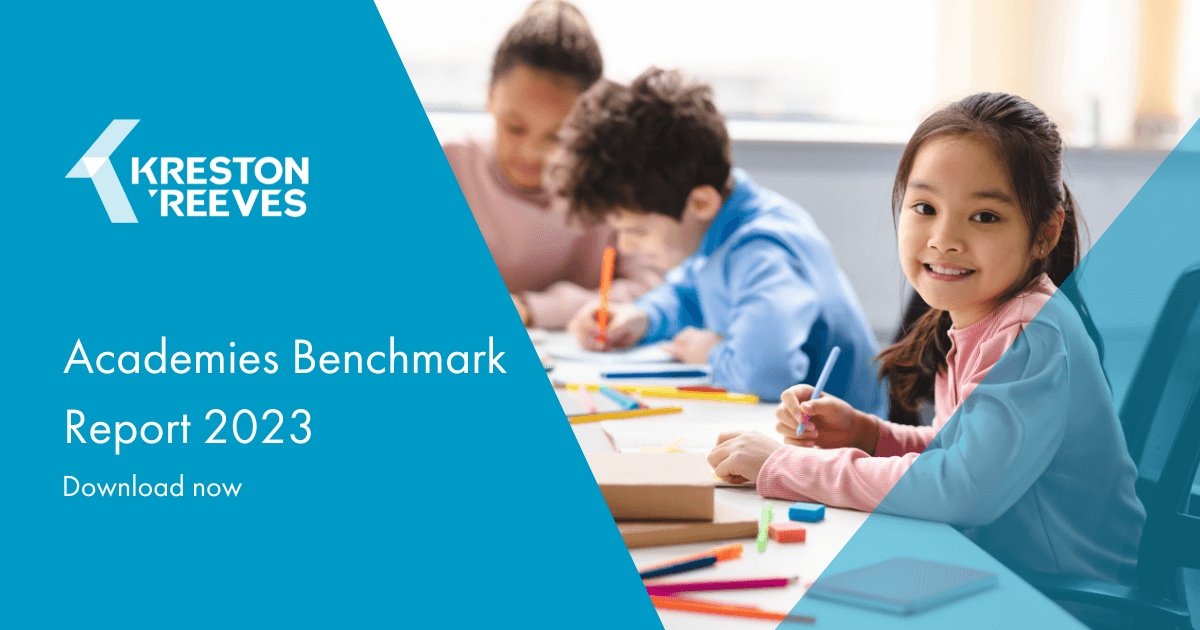Peter Manser FCA DChA
- Audit Compliance Partner and Head of Academies
- +44 (0)330 124 1399
- Email Peter
Suggested:Result oneResult 2Result 3
Sorry, there are no results for this search.
Sorry, there are no results for this search.
View all peoplePublished by Peter Manser on 9 February 2023
Share this article
A newer version of the Academies Benchmark Report is now available. Click here to download the 2024 Academies Benchmark Report.
The 2023 Academies Benchmark captures a financial picture of over 2,700 schools making it the most complete and detailed picture of the academy trusts in the UK.
Here, Peter Manser dips into just some of the headline findings.
There has been a 30% increase in capital spending compared to 2022.
These figures reflect the struggle trusts had to spend capital grants last year as they emerged from the pandemic. We’ve seen trusts accumulating huge shopping lists as post-Covid investments in capital items and fixed assets such as building maintenance, renovations and investment in IT take shape after plans were shelved when schools were dealing with Covid-related disruption. The impact of this delayed spend on budgets could be significant.
The challenge of falling pupil numbers could be acute for primary schools in the years ahead. The Office of National Statistics (ONS) has reported that numbers attending primary and nursery schools peaked in 2019 and are predicted to fall by at least 12% in the next six years.
We have already seen many primary schools having to restructure to cater for lower numbers of pupils, and therefore falling income. Although Covid-19 funding has provided some protection, this is an issue which could have a much longer-term impact for the sector as a whole.
Overall, MAT revenue reserves per pupil have fallen by 7.4% from £802 to £743. This is partly because of rising pupil numbers in secondary schools.
As The Education & Skills Funding Agency (ESFA) has indicated reserves above 20% of income could be subject to scrutiny, the report highlights 11% of MATs are carrying reserves equal to or above this threshold.
Conversations with our clients have revealed that a significant number of trusts with above 20% reserves are thinking about how to spend or designate their funds so they fall below this threshold.
Larger trusts with more than 7,500 pupils have achieved surpluses this year broadly in line with the strong financial performance of 2021, when the average in-year financial surplus doubled to £1.7m.
Some of this could be explained by the fact that all large trusts within this band receive School Condition Allocation (SCA) funding, which means they do not have to make any additional contributions to secure capital funding. In contrast, smaller trusts are subject to the terms of the Condition Improvement Fund (CIF), which requires individual schools to make financial contributions in the form of bids to secure funding for projects such as renovations and building maintenance.
70% of MATs said they expected to grow in 2022/23, with 92% forecasting growth by the end of 2023/24. Over 5% of trusts expected to grow by 7+ schools in 2023 and also 7+ schools in 2024.
There has been a slowdown in the number of schools moving between trusts. 176 academies (1.8% of open academies) moved trust in 2021/22 and only 23% attracted grant funding, a massive decrease from the peak of 63% back in 2014/15. The actual level of funding was £1.73m, substantially down on the £3.16m in 2020/21.
These figures underline the increasing difficulty in securing funding to take on new schools and highlights the critical due diligence needed to ensure new schools will be financially viable.
The full report is available for download. Simply complete the form below to download your copy.
Share this article
This site is protected by reCAPTCHA and the Google Privacy Policy and Terms of Service apply.
Related people
This site is protected by reCAPTCHA and the Google Privacy Policy and Terms of Service apply.
Our complimentary newsletters and event invitations are designed to provide you with regular updates, insight and guidance.
You can unsubscribe from our email communications at any time by emailing [email protected] or by clicking the 'unsubscribe' link found on all our email newsletters and event invitations.
This site is protected by reCAPTCHA and the Google Privacy Policy and Terms of Service apply.






